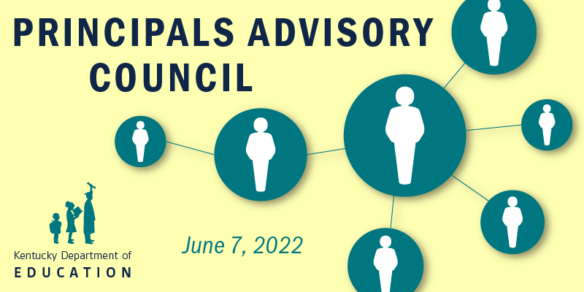
The Kentucky Department of Education’s (KDE’s) Principals Advisory Council (PrAC) heard about the Kentucky Professional Standards for Educational Leaders (PSEL) Guidance for Growth and Evaluation Tool at its June 7 meeting.
Formed by the National Board for Education Administration, the PSEL defines the foundational principles of leadership through 10 interdependent standards meant to guide the practice of education leaders. Since Kentucky adopted the national PSEL standards in 2020, a large group of stakeholders have worked together over the last two years to create a Kentucky-based resource.
KDE Leadership Development Specialist Stacy Noah said the Kentucky PSEL tool provides support and guidance around determining pathway for growth for educational leaders. It builds off the attributes identified for an effective leader in the national PSEL document by expanding the standards to include practices of exemplary, accomplished, developing and ineffective administrators.
While the national PSEL standards are the required criteria in all certified evaluation plans for principals and assistant principals, the accompanying Kentucky PSEL Guidance for Growth and Evaluation tool is optional.
The Kentucky PSEL tool was created using input from principals and assistant principals, superintendents, regional educational cooperatives representatives, university representatives and district office personnel. Now that the tool is published, the group is working on refining, clarifying it and providing examples of high-level, everyday principal actions that correlate to the standards.
Noah said the Kentucky PSEL tool can be continuously improved as “it’s a living tool based on the educational landscape.”
PrAC members provided feedback and suggestions on usability and additional improvements, such as making sure it is accessible to screen readers and creating a more in-depth print version. Members also suggested sharing the information in preparation programs for aspiring principals and with superintendents.
Certified Evaluation Regulation and Training
Noah and Jenny Ray, also a leadership development specialist in KDE’s Office of Educator Licensure and Effectiveness, reminded PrAC members that all new administrators who complete certified school personnel evaluations must be trained, tested and approved in the proper techniques for effective evaluations per 704 KAR 3:370 and KRS 156.557.
This initial 12-hour training is provided by KDE over a two-day period. The training is designed to ensure the evaluation process is a vehicle to positively impact teacher effectiveness and student learning.
KDE will offer four in-person and seven virtual training sessions starting this summer.
In order to lift the financial burden from local districts, there is no fee to participate in the required training, and Effective Instructional Leadership Act (EILA) credit will be awarded.
Once administrators attend the initial KDE training, there is a required 6 hours of subsequent annual training that can be completed through an individual’s district or regional educational cooperative.
More information on the initial certified evaluation training process can be found on the Principal Partnership Project (P3) webpage.
In other business, the council:
- Learned about an update to the P3 podcast. Starting with Episode 15, the podcast is renamed “Principal Podcast Party,” and will have new episodes the first Monday of each month;
- Learned about the principal calendar on the P3 webpage from KDE Leadership Development Specialist Keith Griesser. The calendar contains items specific to the month, as well as ongoing calendar items and professional learning opportunities, cohorts and conferences.
- Received a legislative update from KDE Associate Commissioner Byron Darnall, who directed the principals to KDE’s 2022 Legislative Guidance for a more in-depth explanation of bills passed in the 2022 session.



Leave A Comment